Pursuing the Straight Path | Ibn Taymiyyah
Pursuing the Straight Path | Ibn Taymiyyah
Publisher:
Dakwah Corner Publisher
Author:
Ibn Taymiyyah
Language:
English
Binding:
Hard Cover
Pages: 693
Size: A4|8.3x11.7in | 21 x 29.7 cm
Couldn't load pickup availability
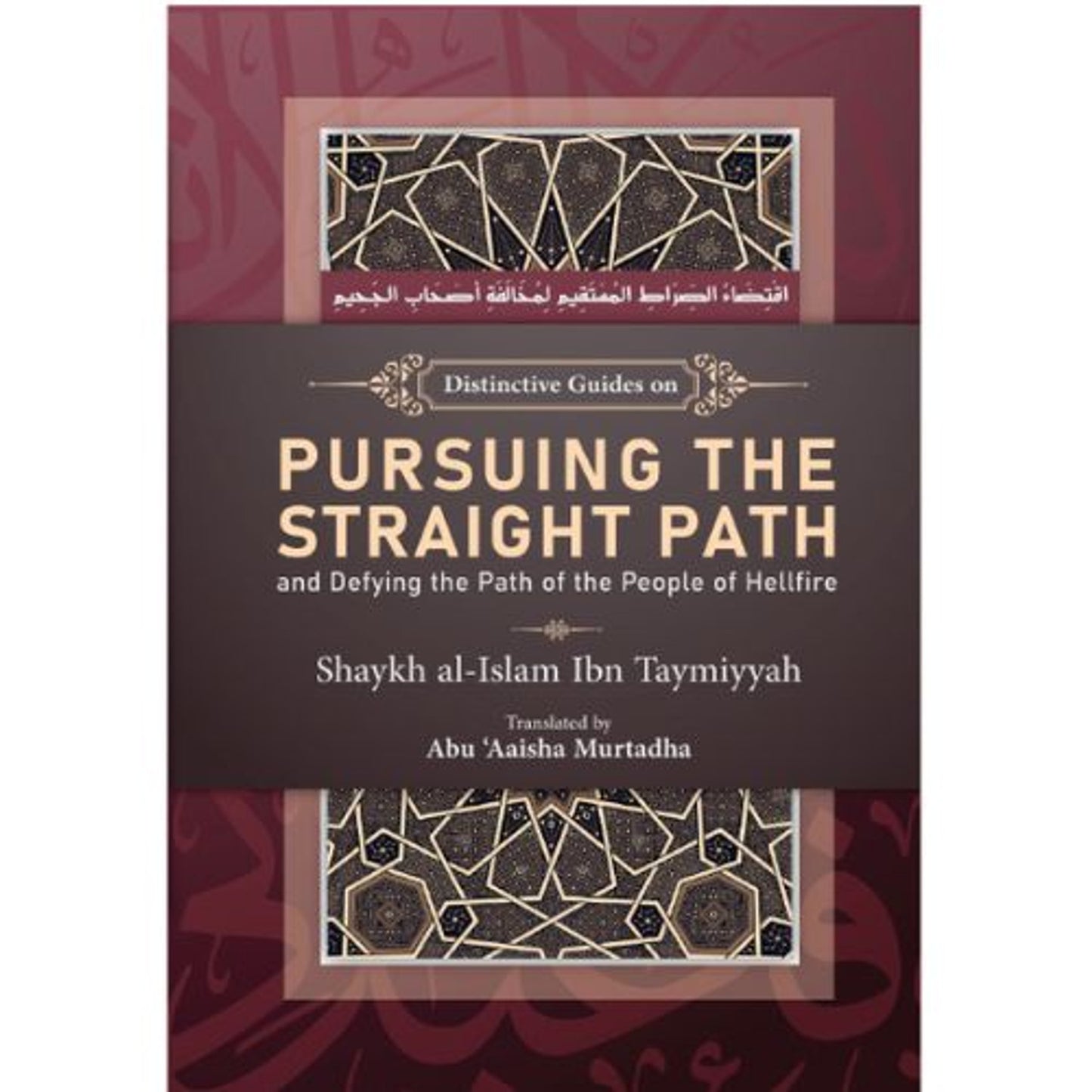
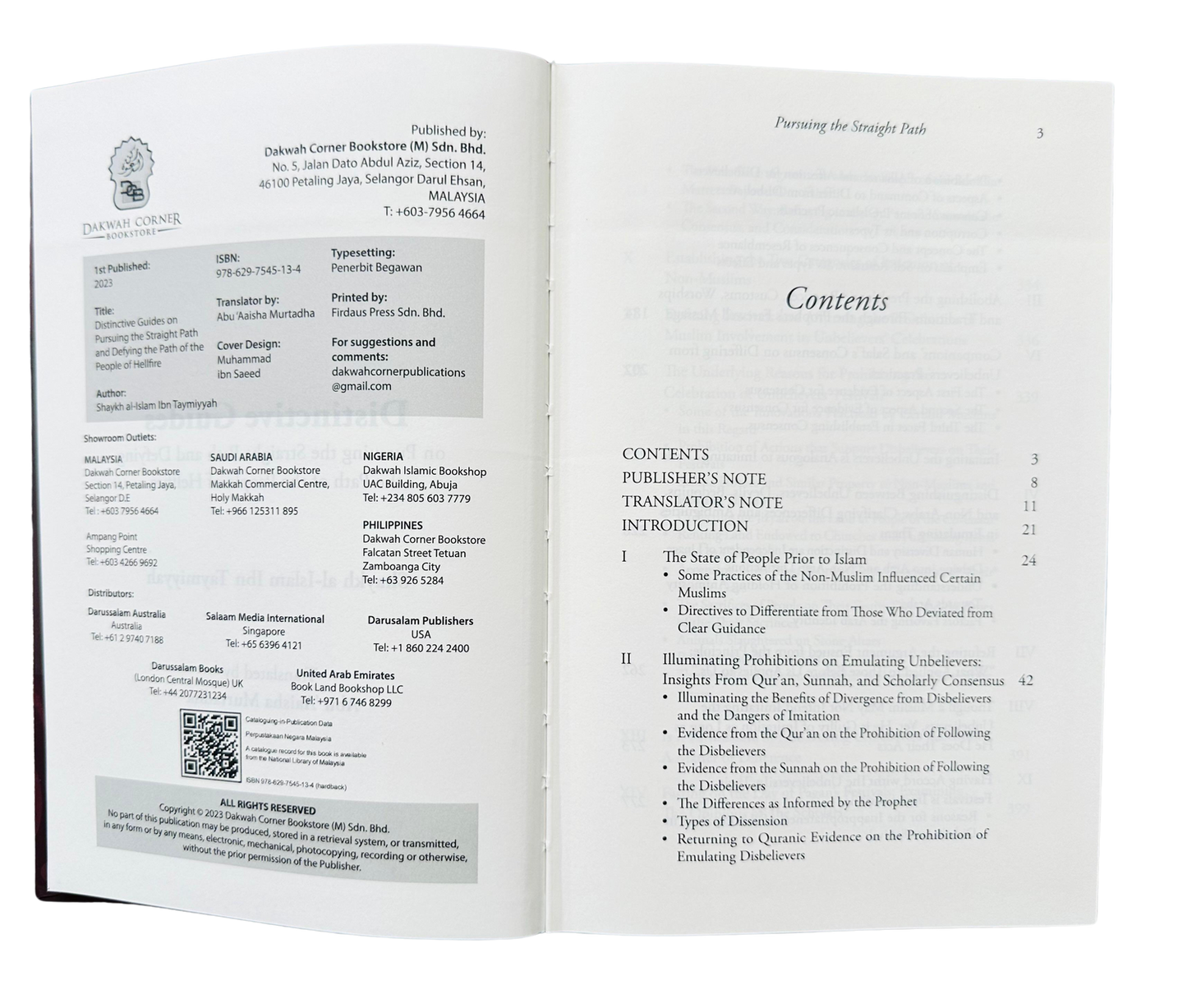
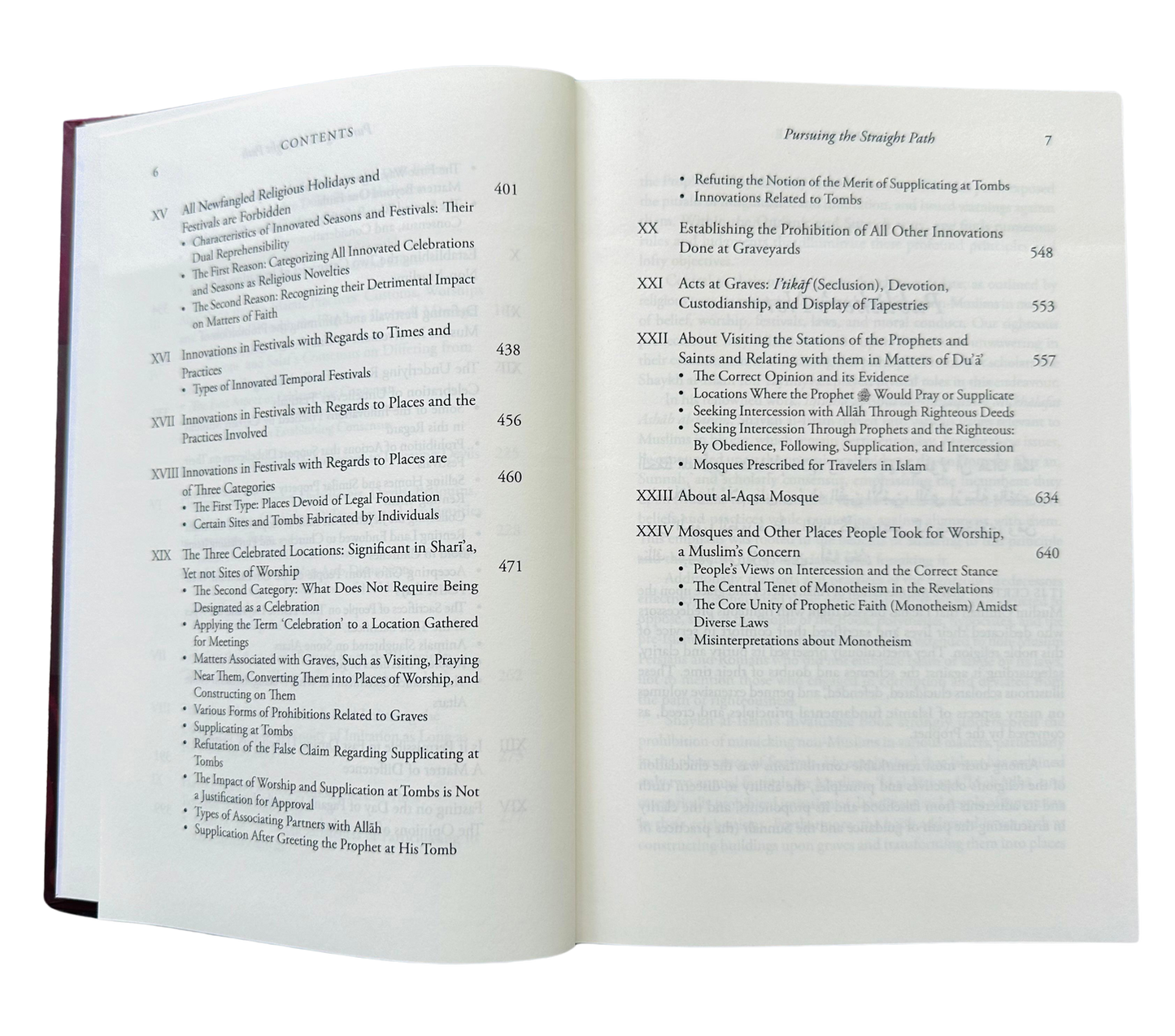
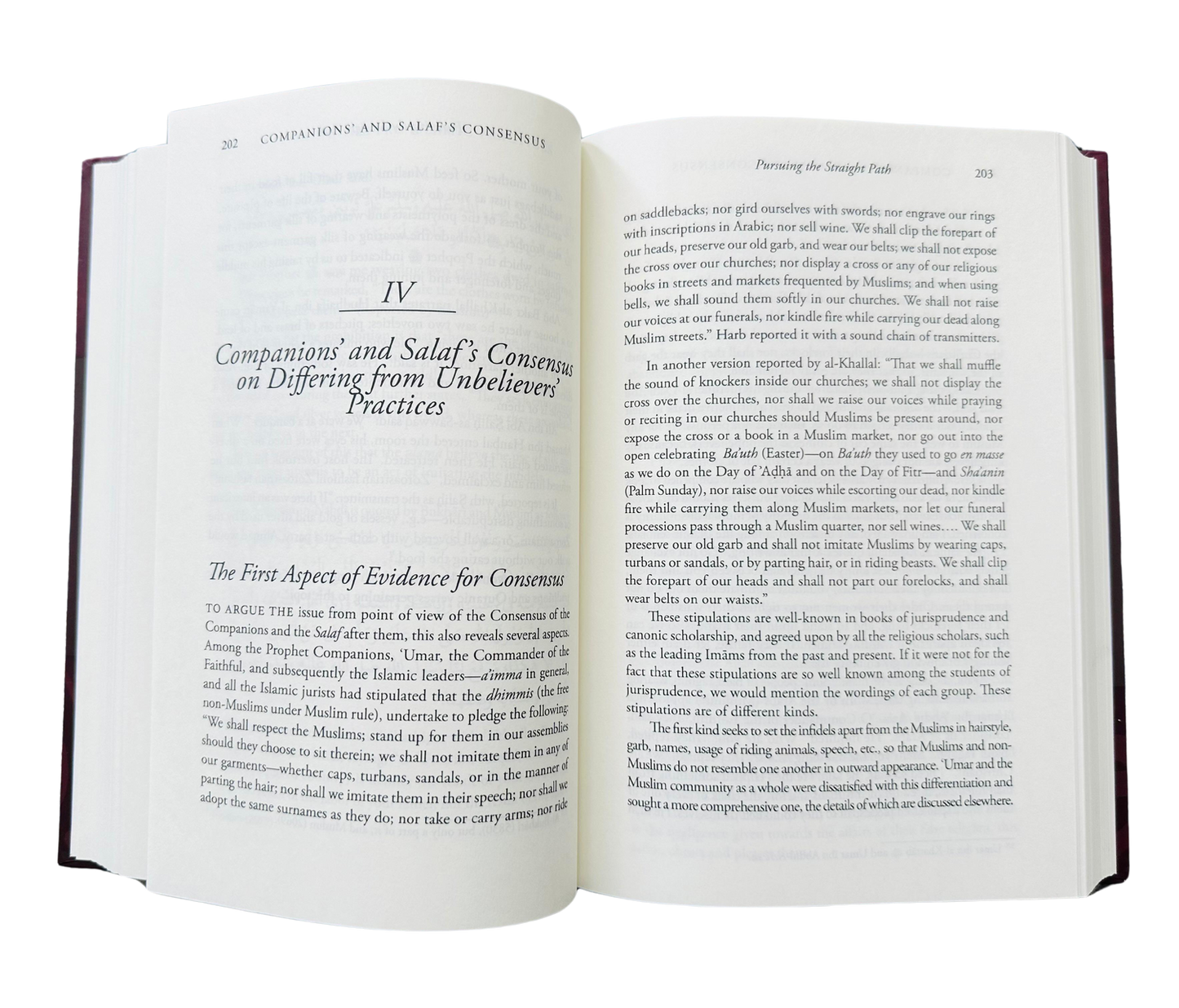
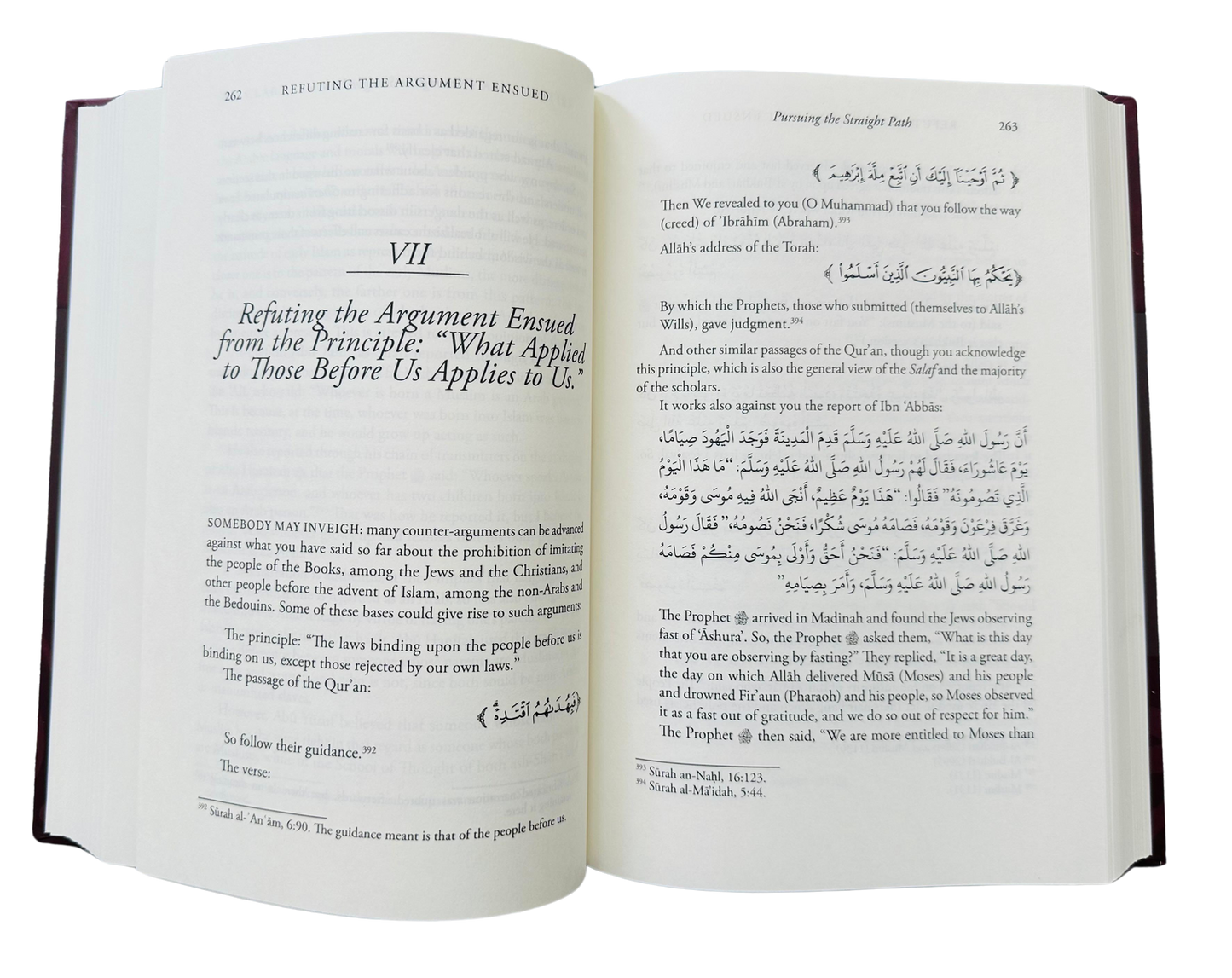
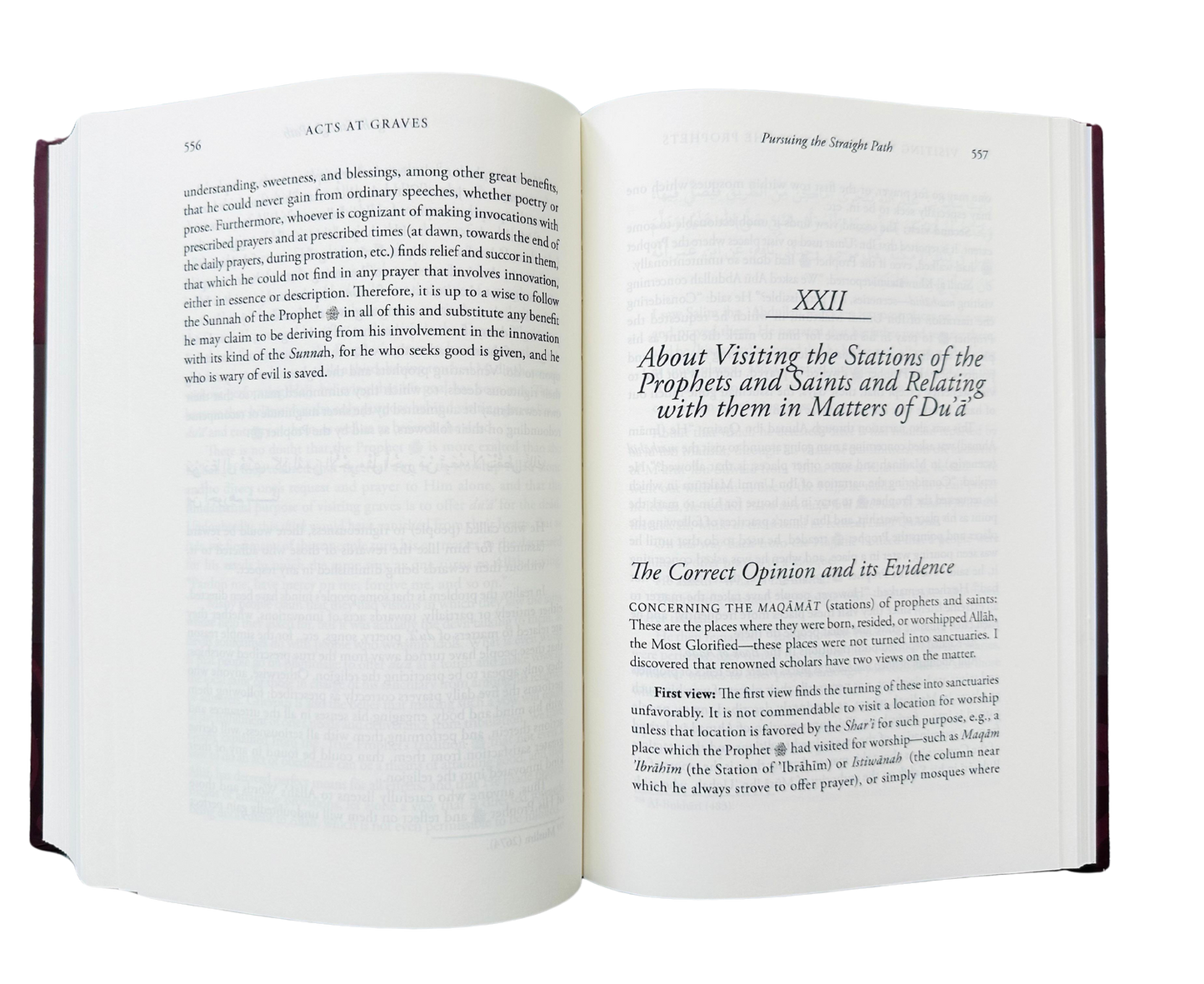
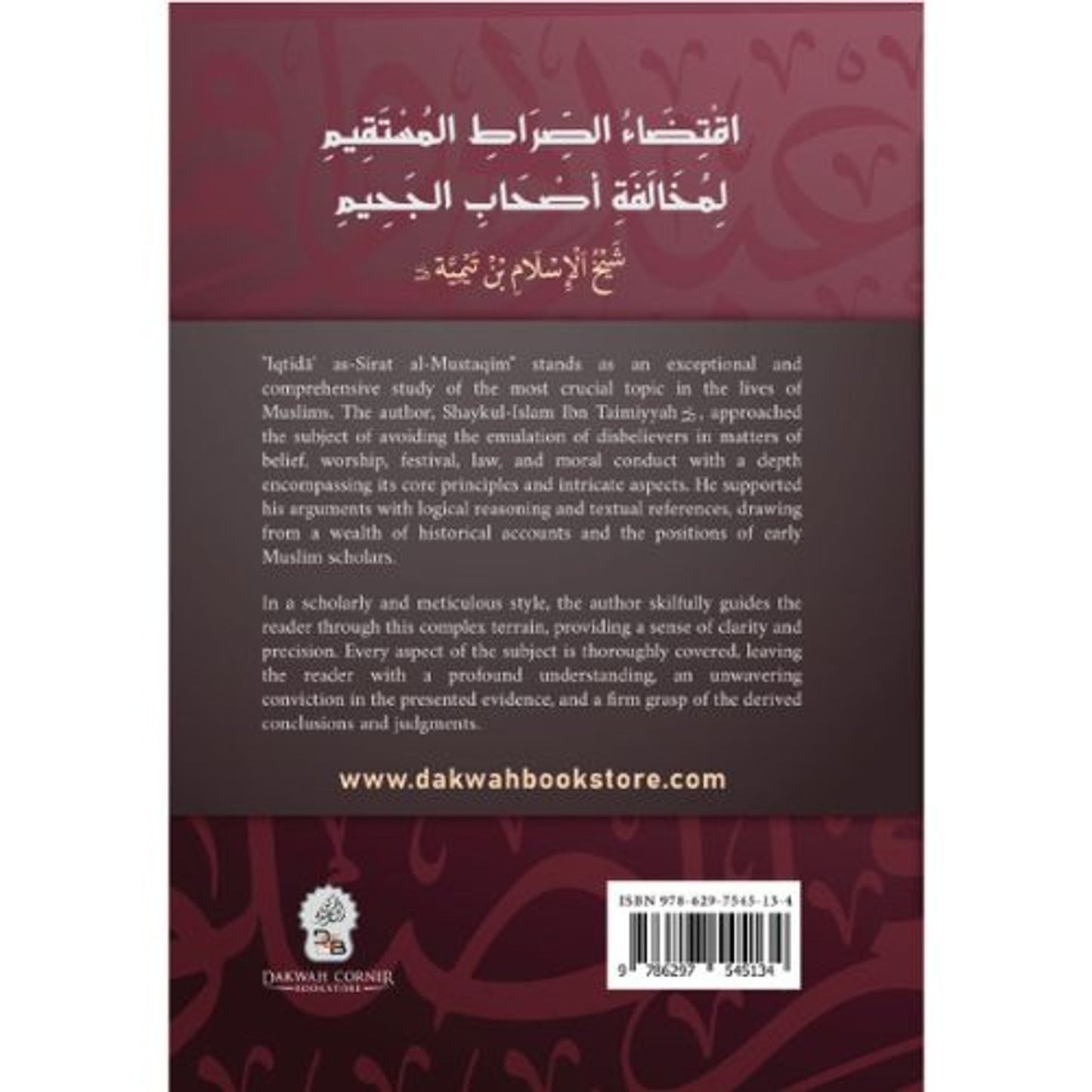
Collapsible content
Description of Book
Pursuing the Straight Path | Ibn Taymiyyah
Pursuing the Straight Path by Ibn Taymiyyah is a profound exploration of the Islamic concept of the 'Straight Path'—the way of truth, righteousness, and spiritual integrity as defined in the Quran and Sunnah. In this work, Ibn Taymiyyah delves deeply into what it means to follow the true path of Islam, emphasizing the importance of faith, adherence to the Quran, and the teachings of the Prophet Muhammad (PBUH). He addresses the challenges that Muslims face in maintaining a pure and sincere practice of their faith amidst various temptations and distractions.
Ibn Taymiyyah provides practical guidance for Muslims on how to stay committed to the Straight Path, exploring key topics such as the importance of sincere worship, the dangers of innovation in religion, and the need for a sound understanding of Islamic principles. He underscores the significance of developing good character, cultivating a strong relationship with Allah, and engaging in righteous actions. Through his teachings, Ibn Taymiyyah seeks to inspire Muslims to align their lives with the core values of Islam and to resist deviations that lead away from the truth.
The book also addresses the intellectual and spiritual challenges of the time, offering a defense of orthodox Islamic beliefs and practices. Ibn Taymiyyah’s work is not only a spiritual guide but also a scholarly defense of the traditional understanding of Islam, making it relevant for both personal reflection and academic study. His emphasis on clarity, logic, and adherence to the foundational texts of Islam makes this book an invaluable resource for those seeking to strengthen their faith and gain a deeper understanding of the true path in Islam.
With accessible language and profound insights, Pursuing the Straight Path is an essential read for anyone looking to deepen their commitment to Islam, understand the challenges of religious practice, and learn how to navigate the complexities of faith in the modern world.
Publisher
Dakwah Corner Publisher
Author
- Ibn Taymiyyah
Sample Pages - Content
Page : 01
المستقيم انها Distinctive Guides on PURSUING THE STRAIGHT PATH and Defying the Path of the People of Hellfire Shaykh al-Islam Ibn Taymiyyah Translated by Abu 'Aaisha Murtadha
Page : 02
DAKWAH CORNER BOOKSTORE 1st Published: 2023 Title: Distinctive Guides on Pursuing the Straight Path and Defying the Path of the People of Hellfire Author: Shaykh al-Islam Ibn Taymiyyah Showroom Outlets: MALAYSIA Dakwah Corner Bookstore Section 14, Petaling Jaya, Selangor D.E Tel:+603 7956 4664 Ampang Point Shopping Centre ISBN: Published by: Dakwah Corner Bookstore (M) Sdn. Bhd. No. 5, Jalan Dato Abdul Aziz, Section 14, 46100 Petaling Jaya, Selangor Darul Ehsan, 978-629-7545-13-4 Translator by: Abu 'Aaisha Murtadha Cover Design: Muhammad ibn Saeed SAUDI ARABIA Dakwah Corner Bookstore Makkah Commercial Centre, Holy Makkah Tel: +966 125311 895 MALAYSIA T: +603-7956 4664 Typesetting: Penerbit Begawan Printed by: Firdaus Press Sdn. Bhd. For suggestions and comments: dakwahcornerpublications @gmail.com NIGERIA Dakwah Islamic Bookshop UAC Building, Abuja Tel: +234 805 603 7779 mon CONTENTS PUBLISHER'S NOTE TRANSLATOR'S NOTE INTRODUCTION PHILIPPINES Dakwah Corner Bookstore Falcatan Street Tetuan I Pursuing the Straight Path Contents The State of People Prior to Islam Tel: +603 4266 9692 Distributors: deriny Darussalam Australia Australia Tel: +61 2 9740 7188 ndl Salaam Media International Singapore Tel: +65 6396 4121 Darussalam Books (London Central Mosque) UK Tel: +44 2077231234 0932 Zamboanga City Tel: +63 926 5284 Darusalam Publishers USA Tel: +1 860 224 2400 United Arab Emirates Book Land Bookshop LLC Tel: +971 6 746 8299 Cataloguing-in-Publication Data Perpustakaan Negara Malaysia A catalogue record for this book is available from the National Library of Malaysia SBN 978-629-7545-13-4 (hardback) ALL RIGHTS RESERVED No part of this publication may be produced, stored in a retrieval system, or transmitted, Copyright © 2023 Dakwah Corner Bookstore (M) Sdn. Bhd. in any form or by any means, electronic, mechanical, photocopying, recording or otherwise, without the prior permission of the Publisher. II 3 8 325 11 21 24 • Some Practices of the Non-Muslim Influenced Certain Muslims • Directives to Differentiate from Those Who Deviated from Clear Guidance Illuminating Prohibitions on Emulating Unbelievers: Insights From Qur'an, Sunnah, and Scholarly Consensus 42 Illuminating the Benefits of Divergence from Disbelievers and the Dangers of Imitation Evidence from the Qur'an on the Prohibition of Following the Disbelievers ⚫ Evidence from the Sunnah on the Prohibition of Following the Disbelievers The Differences as Informed by the Prophet Types of Dissension Returning to Quranic Evidence on the Prohibition of Emulating Disbelievers
Page : 03
CONTENTS M 401 XX XV All Newfangled Religious Holidays and Festivals are Forbidden Characteristics of Innovated Seasons and Festivals: Their Dual Reprehensibility The First Reason: Categorizing All Innovated Celebrations and Seasons as Religious Novelties Pursuing the Straight Path ⚫ Refuting the Notion of the Merit of Supplicating at Tombs • Innovations Related to Tombs Establishing the Prohibition of All Other Innovations Done at Graveyards • Locations Where the Prophet Would Pray or Supplicate • Seeking Intercession with Allah Through Righteous Deeds Ashab Seeking Intercession Through Prophets and the Righteous: Muslims By Obedience, Following, Supplication, and Intercession He Mosques Prescribed for Travelers in Islam 7 548 • Types of Innovated Temporal Festivals on Matters of Faith XVI Innovations in Festivals with Regards to Times and Practices • The Second Reason: Recognizing their Detrimental Impact belief religio Custodianship, and Display of Tapestries XXI Acts at Graves: I'tikaf (Seclusion), Devotion, 553 438 XVII Innovations in Festivals with Regards to Places and the Practices Involved XXII About Visiting the Stations of the Prophets and their Saints and Relating with them in Matters of Du'a' Shay The Correct Opinion and its Evidence 557 456 XVIII Innovations in Festivals with Regards to Places are of Three Categories 460 The First Type: Places Devoid of Legal Foundation . Certain Sites and Tombs Fabricated by Individuals XXIII About al-Aqsa Mosque 634 XIX The Three Celebrated Locations: Significant in Shari'a, Yet not Sites of Worship 471 640 • Applying the Term 'Celebration' to a Location Gathered for Meetings The Second Category: What Does Not Require Being Designated as a Celebration • Matters Associated with Graves, Such as Visiting, Praying Near Them, Converting Them into Places of Worship, and Constructing on Them • Various Forms of Prohibitions Related to Graves Supplicating at Tombs • Refutation of the False Claim Regarding Supplicating at Tombs The Impact of Worship and Supplication at Tombs is Not a Justification for Approval Types of Associating Partners with Allah Supplication After Greeting the Prophet at His Tomb VIX XXIV Mosques and Other Places People Took for Worship, a Muslim's Concern People's Views on Intercession and the Correct Stance • The Central Tenet of Monotheism in the Revelations The Core Unity of Prophetic Faith (Monotheism) Amidst Diverse Laws • Misinterpretations about Monotheism places
Page : 04
202 COMPANIONS' AND SALAF'S CONSENSUS IV Companions and Salaf's Consensus on Differing from Unbelievers Practices The First Aspect of Evidence for Consensus TO ARGUE THE issue from point of view of the Consensus of the Companions and the Salaf after them, this also reveals several aspects. Among the Prophet Companions, 'Umar, the Commander of the Faithful, and subsequently the Islamic leaders-d'imma in general, and all the Islamic jurists had stipulated that the dhimmis (the free non-Muslims under Muslim rule), undertake to pledge the following "We shall respect the Muslims; stand up for them in our assemblies should they choose to sit therein; we shall not imitate them in any of our garments-whether caps, turbans, sandals, or in the manner of parting the hair; nor shall we imitate them in their speech; nor shall we adopt the same surnames as they do; nor take or carry arms; nor ride 20 Pursuing the Straight Path 203 on saddlebacks; nor gird ourselves with swords; nor engrave our rings with inscriptions in Arabic; nor sell wine. We shall clip the forepart of our heads, preserve our old garb, and wear our belts; we shall not expose the cross over our churches; nor display a cross or any of our religious books in streets and markets frequented by Muslims; and when using bells, we shall sound them softly in our churches. We shall not raise our voices at our funerals, nor kindle fire while carrying our dead along Muslim streets." Harb reported it with a sound chain of transmitters. In another version reported by al-Khallal: "That we shall muffle the sound of knockers inside our churches; we shall not display the cross over the churches, nor shall we raise our voices while praying or reciting in our churches should Muslims be present around, nor expose the cross or a book in a Muslim market, nor go out into the open celebrating Bauth (Easter)-on Bauth they used to go en masse as we do on the Day of 'Adha and on the Day of Fitr-and Sha'anin (Palm Sunday), nor raise our voices while escorting our dead, nor kindle fire while carrying them along Muslim markets, nor let our funeral processions pass through a Muslim quarter, nor sell wines.... We shall preserve our old garb and shall not imitate Muslims by wearing caps, turbans or sandals, or by parting hair, or in riding beasts. We shall clip the forepart of our heads and shall not part our forelocks, and shall wear belts on our waists." These stipulations are well-known in books of jurisprudence and canonic scholarship, and agreed upon by all the religious scholars, such as the leading Imams from the past and present. If it were not for the fact that these stipulations are so well known among the students of jurisprudence, we would mention the wordings of each group. These stipulations are of different kinds. The first kind seeks to set the infidels apart from the Muslims in hairstyle, garb, names, usage of riding animals, speech, etc., so that Muslims and non- Muslims do not resemble one another in outward appearance. "Umar and the Muslim community as a whole were dissatisfied with this differentiation and sought a more comprehensive one, the details of which are discussed elsewhere.
Page : 05
262 REFUTING THE ARGUMENT ENSUED a Pursuing the Straight Path 263 ثُمَّ أَوْحَيْنَا إِلَيْكَ أَنِ اتَّبِعْ مِلَّةَ إِبْرَاهِيمَ ) Then We revealed to you (O Muhammad) that you follow the way (creed) of 'Ibrahim (Abraham),393 Allah's address of the Torah: VII Refuting the Argument Ensued from the Principle: "What Applied to Those Before Us Applies to Us." يحكمُ بِهَا النَّبِيُّونَ الَّذِينَ أَسْلَمُوا ) By which the Prophets, those who submitted (themselves to Allah's Wills), gave judgment.394 And other similar passages of the Qur'an, though you acknowledge this principle, which is also the general view of the Salaf and the majority of the scholars. It works also against you the report of Ibn 'Abbas: SOMEBODY MAY INVEIGH: many counter-arguments can be advanced against what you have said so far about the prohibition of imitating the people of the Books, among the Jews and the Christians, and other people before the advent of Islam, among the non-Arabs and the Bedouins. Some of these bases could give rise to such arguments: The principle: "The laws binding upon the people before us is binding on us, except those rejected by our own laws." The passage of the Qur'an: So follow their guidance.392 The verse: الهُدَهُمُ اقْتَية ) 992 Surah al-An' am, 6:90. The guidance meant is that of the people before us. أَنَّ رَسُولَ اللهِ صَلَّى اللهُ عَلَيْهِ وَسَلَّمَ قَدِمَ الْمَدِينَةَ فَوَجَدَ الْيَهُودَ صِيَامًا، يَوْمَ عَاشُورَاءَ، فَقَالَ لَهُمْ رَسُولُ اللهِ صَلَّى اللَّهُ عَلَيْهِ وَسَلَّمَ: مَا هَذَا الْيَوْمُ الَّذِي تَصُومُونَهُ فَقَالُوا: هَذَا يَوْمُ عَظِيمُ، أَنْجَى اللَّهُ فِيهِ مُوسَى وَقَوْمَهُ، وَغَرَّقَ فِرْعَوْنَ وَقَوْمَهُ، فَصَامَهُ مُوسَى شُكْرًا، فَنَحْنُ نَصُومُهُ، فَقَالَ رَسُولُ اللهِ صَلَّى اللهُ عَلَيْهِ وَسَلَّمَ: فَنَحْنُ أَحَقُّ وَأَوْلَى بِمُوسَى مِنْكُمْ فَصَامَهُ رَسُولُ اللهِ صَلَّى اللهُ عَلَيْهِ وَسَلَّمَ، وَأَمَرَ بِصِيَامِهِ" The Prophet arrived in Madinah and found the Jews observing fast of 'Ashura'. So, the Prophet asked them, "What is this day that you are observing by fasting?" They replied, "It is a great day, the day on which Allah delivered Müsä (Moses) and his people and drowned Fir'aun (Pharaoh) and his people, so Moses observed it as a fast out of gratitude, and we do so out of respect for him." The Prophet then said, "We are more entitled to Moses than 393 Surah an-Nahl, 16:123. 394 Surah al-Ma'idah, 5:44.
Page : 06
556 ACTS AT GRAVES understanding, sweetness, and blessings, among other great benefits, that he could never gain from ordinary speeches, whether poetry or prose. Furthermore, whoever is cognizant of making invocations with prescribed prayers and at prescribed times (at dawn, towards the end of the daily prayers, during prostration, etc.) finds relief and succor in them, that which he could not find in any prayer that involves innovation, either in essence or description. Therefore, it is up to a wise to follow the Sunnah of the Prophet in all of this and substitute any benefit he may claim to be deriving from his involvement in the innovation with its kind of the Sunnah, for he who seeks good is given, and he who is wary of evil is saved. этобой Pursuing the Straight Path SITI 557 XXII About Visiting the Stations of the Prophets and Saints and Relating with them in Matters of Du'a' dairwor bas The Correct Opinion and its Evidence CONCERNING THE MAQAMAT (stations) of prophets and saints: These are the places where they were born, resided, or worshipped Allah, the Most Glorified these places were not turned into sanctuaries. I discovered that renowned scholars have two views on the matter. First view: The first view finds the turning of these into sanctuaries unfavorably. It is not commendable to visit a location for worship unless that location is favored by the Shar'i for such purpose, e.g., a place which the Prophet had visited for worship-such as Maqam Ibrahim (the Station of 'Ibrahim) or Istiwanah (the column near which he always strove to offer prayer), or simply mosques wher:
Page : 07
اقتضاءُ الصِرَاطِ الْمُسْتَقِيمِ لِمُخَالَفَةِ أَصْحَابِ الجَحِيمِ شيخ الإسلام بن تيمية - ٧٥٧ "Iqtida as-Sirat al-Mustaqim stands as an exceptional and comprehensive study of the most crucial topic in the lives of Muslims. The author, Shaykul-Islam Ibn Taimiyyah, approached the subject of avoiding the emulation of disbelievers in matters of belief, worship, festival, law, and moral conduct with a depth encompassing its core principles and intricate aspects. He supported his arguments with logical reasoning and textual references, drawing from a wealth of historical accounts and the positions of early Muslim scholars. In a scholarly and meticulous style, the author skilfully guides the reader through this complex terrain, providing a sense of clarity and precision. Every aspect of the subject is thoroughly covered, leaving the reader with a profound understanding an unwavering conviction in the presented evidence, and a firm grasp of the derived conclusions and judgments. www.dakwahbookstore.com DAKWAH CORNIR ISBN 978-629-7545-13-4 9786297 545134
ibn Taymiyyah
Ibn Taymiyyah (1263–1328) was a highly influential Islamic scholar and theologian known for his dedication to the Quran and Sunnah. Originating from Harran, he became a leading figure in the Hanbali school of thought. Ibn Taymiyyah advocated for a pure and direct approach to Islamic teachings, urging Muslims to avoid practices he considered innovations, like saint worship and shrine reverence. His writings span theology, law, and philosophy, leaving a lasting impact on Islamic thought and inspiring later reformers. While his interpretations are sometimes debated, his scholarship remains deeply respected across the Muslim world.







